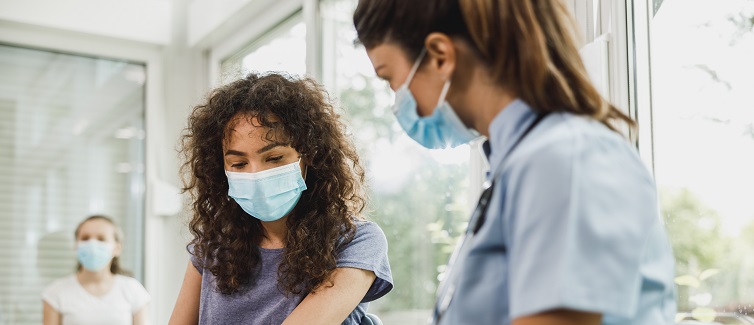Polycystic ovary syndrome (PCOS) is a common hormonal condition in adult women. But it can start in adolescence after a girl starts menstruating.
Girls begin to produce sex hormones when they enter puberty, usually around 8 to 13 years old. They make both female hormones like estrogens, and some male hormones (also known as androgens). PCOS happens when a girl or woman has a hormone imbalance and produces abnormally high amounts of androgens.
It’s thought that 6% to 18% of adolescent girls have PCOS. It’s important to get a proper diagnosis because PCOS can impact a girl’s health and wellbeing as they get older.
Here’s how to recognize the symptoms of PCOS in adolescents, how it’s diagnosed, and how to manage this condition.
Never Miss a Beat!
Subscribe to Our HealthBeat Newsletter!
Thank you for subscribing!
You can now select the specific newsletters you'd like to receive.
You are already subscribed.
Subscribe to more newsletters in our email preference center.
Sorry, an error occurred. Please try again later.
Get Healthy Tips Sent to Your Phone!
PCOS Symptoms in Adolescents
The high levels of androgens in girls with PCOS can interfere with ovulation and cause irregular or missed periods. This is the classic symptom of PCOS. Most of the time this is a result of weight gain.
Very rarely, PCOS in adolescents causes cysts (fluid-filled sacs) on the ovaries.
Other PCOS symptoms can vary, but they often include:
- Excess hair growth on the face, chest, or belly.
- Thinning hair on the head.
- Acne and clogged pores.
- Excessive weight gain or difficulty losing excess weight.
- Dark, thickened skin on the neck, armpits, or under the breasts (called acanthosis nigricans).
It’s easy to overlook symptoms of PCOS in adolescents. That’s because some symptoms, like irregular periods or acne, are also a normal part of puberty.
Diagnosing PCOS in Adolescents
If you think your adolescent daughter or a loved one might have PCOS or be at risk for PCOS, talk to their doctor and schedule an appointment. There isn’t one definitive test to diagnose PCOS. Instead, the doctor will consider their medical history, signs, symptoms, and labs.
Their doctor may:
- Review when their periods started and how often they occur.
- Ask about any family history of PCOS. (It often runs in families.)
- Ask when they started showing signs of puberty. PCOS is more common in girls with early puberty (before 8 years old).
- Look for signs of PCOS, like acanthosis nigricans, excess hair growth on the face or body.
- Monitor their weight because excess weight gain is common with PCOS.
- Do blood tests to check cholesterol, blood sugar, and insulin levels, which are often high with PCOS. Blood tests can also rule out other conditions, like thyroid or other hormone problems.
PCOS is tricky to diagnose in adolescents because their bodies and hormones are still changing. Doctors look for a history of irregular periods and signs of high levels of androgens. But sometimes, they can’t say for sure if it’s PCOS until a girl is older and has had their period for several years.
It’s not unusual for an adolescent to have some PCOS symptoms, but not enough to make a diagnosis. In that case, their doctor might say they are “at risk for PCOS.” They’ll monitor them for the next few years to see if their periods become regular and their hormones stabilize.
How Girls Can Manage PCOS
The hormonal imbalances from PCOS can lead to obesity and insulin resistance. These put women at a higher risk of diabetes and heart disease as they get older. Also, when left untreated, PCOS might make it harder for a woman to get pregnant when and if they are ready to have a family.
Those who have PCOS or are at risk for PCOS can manage the symptoms and hormonal effects with lifestyle changes and medication. Adolescents with PCOS should understand the potential health problems that might happen down the road. That way, they can be proactive and make lifestyle changes to stay healthy.
One of the biggest concerns about adolescent PCOS is a girl’s emotional wellbeing. Having PCOS often causes anxiety and depression because adolescents (and women) struggle with weight gain and other symptoms. So it’s essential to stay in close contact with their health care team.
Health care providers can help girls stay healthy and reduce PCOS symptoms by:
- Guiding them on a healthy diet and exercise to lose excess weight.
- Treating acne or excess facial hair growth with medicine or cosmetic dermatology procedures.
- Prescribing medicine, if needed, to manage blood sugar or balance sex hormones.
- Teaching them ways to manage feelings of anxiety or depression that PCOS might cause.
It’s also crucial for girls with PCOS who are sexually active to talk to their doctor about birth control. Even though PCOS interferes with ovulation and causes irregular periods, girls can still get pregnant.
Sources
About UPMC Magee-Womens
Built upon our flagship, UPMC Magee-Womens Hospital in Pittsburgh, and its century-plus history of providing high-quality medical care for people at all stages of life, UPMC Magee-Womens is nationally renowned for its outstanding care for women and their families.
Our Magee-Womens network – from women’s imaging centers and specialty care to outpatient and hospital-based services – provides care throughout Pennsylvania, so the help you need is always close to home. More than 25,000 babies are born at our network hospitals each year, with 10,000 of those babies born at UPMC Magee in Pittsburgh, home to one of the largest NICUs in the country. The Department of Health and Human Services recognizes Magee in Pittsburgh as a National Center of Excellence in Women’s Health; U.S. News & World Report ranks Magee nationally in gynecology. The Magee-Womens Research Institute was the first and is the largest research institute in the U.S. devoted exclusively to women’s health and reproductive biology, with locations in Pittsburgh and Erie.
